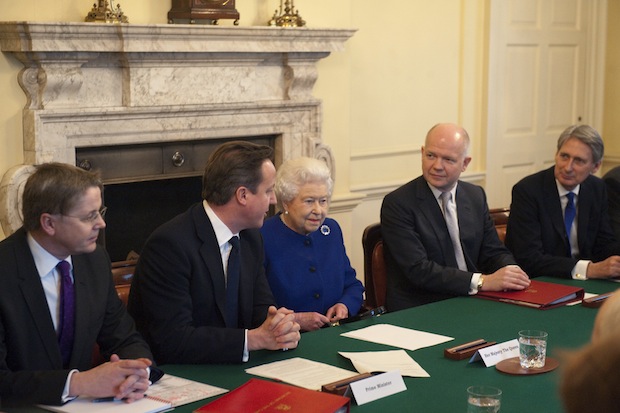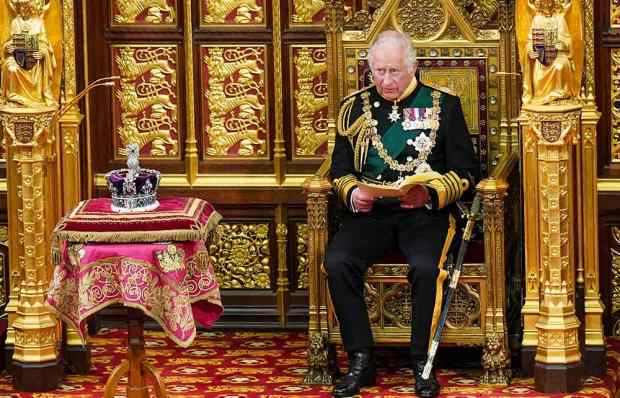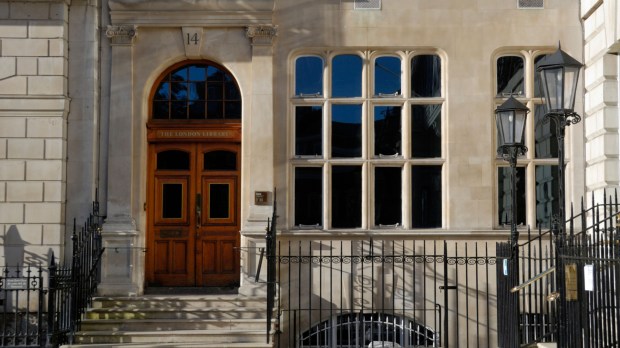AS THE WHOLE Leveson wrangle approaches its climax (or anti-climax), one collateral, innocent victim of it all is the Queen. The government ruse to make its proposed system of statutory regulation seem less objectionable was to burble on about a Royal Charter and the Privy Council. By doing so, it hoped to put the matter beyond politics. But the implication that the enterprise is sanctioned by monarchical neutrality is a) untrue and b) embarrassing for the monarch. Untrue because in royal charters, as in legislation, the Sovereign acts solely on the advice of her ministers, making no personal contribution; embarrassing because, by seeking royal cover for its actions, the government drops the monarch into a very tricky issue, giving her no means to defend herself. Like Tony Blair’s attempt to abolish the office of Lord Chancellor over a weekend, or Gordon Brown’s pretence that Downing Street would no longer have anything to do with ecclesiastical appointments, this is inconsiderate. The machine did not protect the Palace enough, despite polite protests. Government on one side and the press on the other are making the Crown piggy in the middle.
A FRIEND has exhumed instructions issued to Daily Mail journalists by their editor, Mike Randall, in the mid-1960s, about how to behave. The first three items read: ‘1. No member of Daily Mail staff intrudes or is called upon to intrude into private lives where no public interest is involved. 2. No ordinary member of the public is lured, coerced or in any way pressed by a Daily Mail representative into giving an interview or picture which he is clearly unwilling to give. 3. It remains our duty at all times to expose the fraud and reveal the mountebank wherever the public interest is involved.’ This is a good deal crisper than Leveson, but it may be significant that Mr Randall lasted only three years in the editor’s chair, before being removed because of falling circulation.
ONE INSTINCTIVELY recoils from the idea that inspectors should be allowed secretly to film scenes in care homes. Permanent snooping is nasty. The trouble is that film makes so much difference. I am thinking about this because of the news on Tuesday that the Independent Police Complaints Commission has decided that the Police Federation in the West Midlands transgressed on ‘an issue of honesty and integrity’ about what happened during their visit, about a year ago, to Andrew Mitchell, then the Chief Whip, to discuss his version of ‘Plebgate’. Mr Mitchell’s assistant recorded the meeting, without the knowledge of the Federation delegation. If you listen to the recording — it is publicly available — you can be in no doubt that the police lied their heads off in their account of the meeting. Without it, Mr Mitchell would never have been able to establish his case.
IT HAS BEEN pointed out (possibly by me, among many) how hypocritical Ed Miliband is in complaining about energy prices since he was responsible, as Energy Secretary, for driving them up through green levies. We critics have been slow to realise that it is exactly because of his history that Mr Miliband is pushing his price freeze so hard. He knows — because he helped preside over it — that rises in the levies are inevitable, since they are written into the law of the land and of the EU — not just for now, but for many years ahead. He has calculated, with the same background knowledge, how he can freeze for a bit (the promise runs only until early 2017) and then let them push up later, or, even better from his political point of view, provoke the companies into raising them between now and the election. If he wins, of course, he will be hoist by his own petard. But that is a small price for victory.
THANKS to Maj-General Barney White-Spunner, I managed to get into Iraq in April 2003. In 2007, Barney was appointed to command British forces in Basra. He told me how sad he was that the Basra museum had been thoroughly looted just before the city’s conquest in 2003. He wanted to put things right. I arranged for us to have lunch with Neil MacGregor, the director of the British Museum, and John Curtis, the head of its Middle Eastern collection. They were typically positive and resourceful. Ever since then, they have assisted the Basra museum’s recovery — training and advising its staff, rather as British troops helped train Iraqi ones, and seeking sponsorship. Needless to say, the delays seemed endless, but last week we learnt that the Basra museum will reopen roughly a year from now, with a large proportion of its original Babylonian and Sumerian antiquities recovered. The old museum was badly damaged in the fighting, but the new one puts to good use Saddam Hussein’s massive lakeside palace. One feels that the British government would do well to contract out its foreign policy to the British Museum.
THE DAILY TELEGRAPH now has a policy that all its journalists should be on Twitter. This is a good idea, since it is the most immediate form of public communication, and a way of advertising oneself. So last week, I went on. The problem is that I have not got the faintest idea what to say. After agonising for about half an hour, I decided this might be my May 1979 moment, so I wrote: ‘I’ve joined Twitter. Where there is discord, may I bring more of it.’ Immediately, I received emails and texts warning me that someone was pretending to be me (this has happened before). Since then, I have had nothing to say, and I feel like a Twitt. If I do have a thought, I want to keep it for my columns. If I don’t, I am reluctant to share that nullity with others (though I notice that not everyone is restrained by such a feeling). What is expected? I feel like my poor maternal grandfather, who had no capacity for small talk. His last gambit, which he usually played before the first course had finished, was ‘Read any good books lately?’ Then he relapsed into silence.
Got something to add? Join the discussion and comment below.
Get 10 issues for just $10
Subscribe to The Spectator Australia today for the next 10 magazine issues, plus full online access, for just $10.
You might disagree with half of it, but you’ll enjoy reading all of it. Try your first month for free, then just $2 a week for the remainder of your first year.















Comments
Don't miss out
Join the conversation with other Spectator Australia readers. Subscribe to leave a comment.
SUBSCRIBEAlready a subscriber? Log in